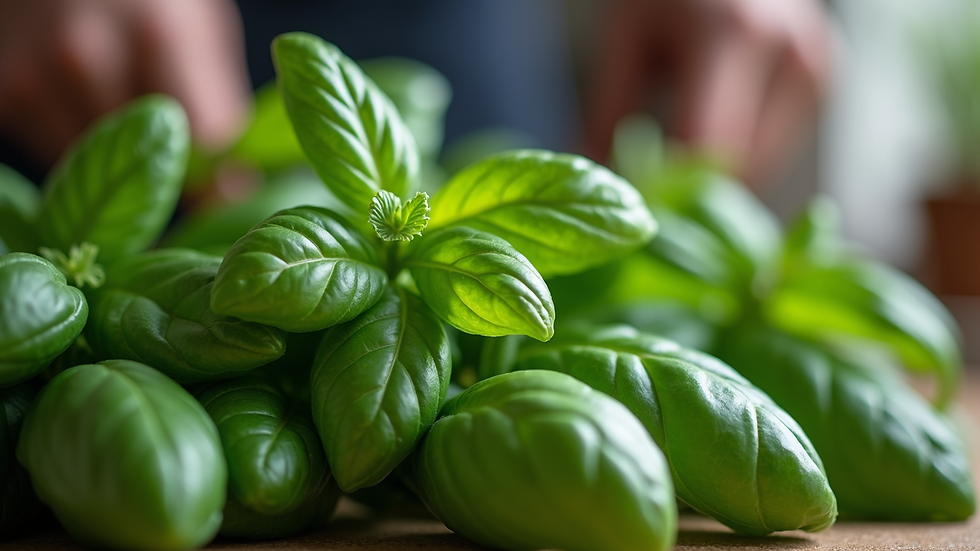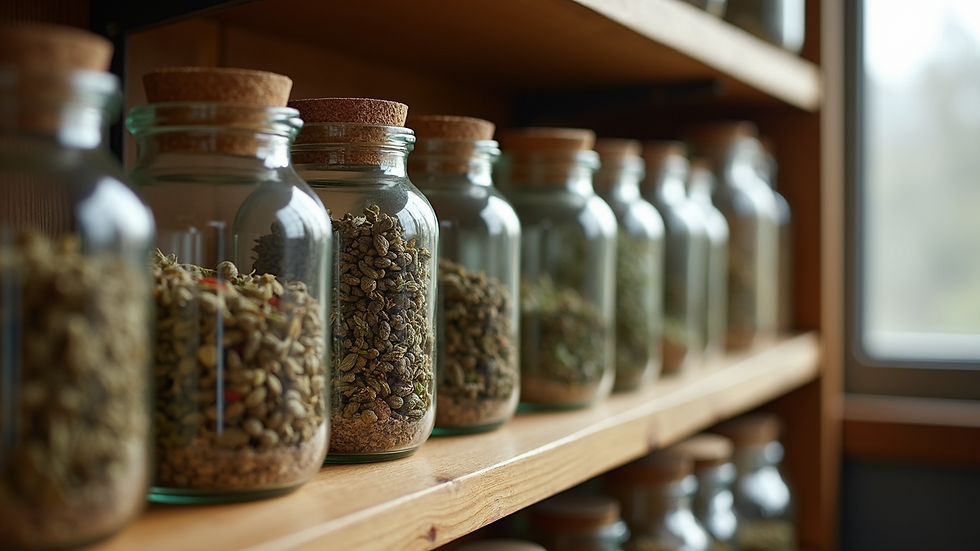Unlocking the Properties of Herbs
- Azaya Organics
- Sep 23, 2025
- 3 min read
Herbs have been cherished for centuries, not only for their ability to enhance the taste of food but also for their numerous health benefits. From the kitchen to natural remedies, herbs play a vital role in our daily lives. This article explores the fascinating world of herbs, focusing on their culinary uses, health impacts, and how to make the most of their unique qualities.
Exploring the Uses of Herbs in Cooking
Herbs are an essential ingredient in kitchens worldwide. They add aroma, flavor, and color to dishes, transforming simple meals into culinary delights. Some of the most popular herbs used in cooking include basil, rosemary, thyme, cilantro, and parsley. Each herb brings a distinct taste and character to food.
Basil is often used in Italian dishes like pesto and tomato sauces.
Rosemary pairs well with roasted meats and vegetables.
Thyme is a staple in soups, stews, and marinades.
Cilantro adds freshness to Mexican and Asian cuisines.
Parsley is commonly used as a garnish or in salads.
Using fresh herbs can elevate the flavor profile of your meals without adding extra calories or sodium. Dried herbs are also convenient and retain much of their flavor when stored properly.
Tips for Cooking with Herbs
Add delicate herbs like basil and parsley at the end of cooking to preserve their flavor.
Use hardy herbs such as rosemary and thyme early in the cooking process to allow their flavors to infuse.
Experiment with herb combinations to create unique taste experiences.
Grow your own herbs at home for the freshest ingredients.

What do herbs do for the body?
Herbs are not just flavor enhancers; they also offer a range of health benefits. Many herbs contain antioxidants, vitamins, and minerals that support overall wellness. For example:
Turmeric contains curcumin, known for its anti-inflammatory properties.
Ginger helps with digestion and nausea.
Mint can soothe the stomach and improve digestion.
Garlic is known for its immune-boosting effects.
Incorporating herbs into your diet can help reduce inflammation, improve digestion, and support the immune system. Herbal teas are a popular way to enjoy these benefits, providing a soothing and natural remedy for various ailments.
Practical Ways to Use Herbs for Health
Brew herbal teas using fresh or dried leaves.
Add herbs to smoothies for an extra nutrient boost.
Use herbs in homemade salad dressings and sauces.
Incorporate herbs into soups and stews for added health benefits.

Unlocking the properties of herbs
Understanding the properties of herbs is key to maximizing their benefits. Herbs contain essential oils, antioxidants, and other bioactive compounds that contribute to their therapeutic effects. These properties vary depending on the herb and how it is prepared.
For example, the essential oils in rosemary have antimicrobial and antioxidant effects, making it useful for both culinary and medicinal purposes. Similarly, the antioxidants in oregano can help protect cells from damage.
When selecting herbs, consider their source and quality. Organic herbs tend to have higher concentrations of beneficial compounds. Proper storage is also important to preserve their properties - keep herbs in a cool, dark place and use them within a reasonable time frame.
How to Preserve Herb Properties
Store dried herbs in airtight containers away from light.
Freeze fresh herbs to maintain flavor and nutrients.
Use gentle cooking methods to avoid destroying delicate compounds.

Growing Your Own Herbs: A Simple Guide
Growing herbs at home is a rewarding way to ensure a fresh supply for cooking and health uses. Many herbs are easy to cultivate indoors or in a garden.
Steps to Start Your Herb Garden
Choose herbs suited to your climate and space.
Use well-draining soil and containers with drainage holes.
Place herbs in a sunny spot with at least 6 hours of light daily.
Water regularly but avoid overwatering.
Harvest leaves frequently to encourage growth.
Popular herbs for beginners include basil, mint, chives, and thyme. Growing your own herbs also reduces the need for store-bought options, ensuring you have access to fresh, chemical-free ingredients.
Incorporating Herbs into Everyday Life
Herbs can be seamlessly integrated into daily routines beyond cooking. They can be used in natural skincare, homemade cleaning products, and aromatherapy.
Skincare: Chamomile and lavender have soothing properties for the skin.
Cleaning: Lemon and eucalyptus oils provide natural antibacterial effects.
Aromatherapy: Herbs like rosemary and peppermint can improve focus and reduce stress.
By exploring the diverse uses of herbs, you can enhance your lifestyle naturally and sustainably.
Unlocking the potential of herbs opens up a world of flavor and wellness. Whether you are cooking a meal, brewing a tea, or growing your own garden, herbs offer endless possibilities to enrich your life. Embrace the natural goodness of herbs and discover how they can transform your health and culinary experiences.



Comments